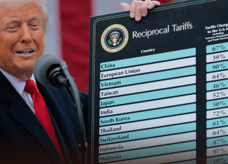In an unexpected but impactful policy move, the U.S. government under President Donald Trump has introduced sweeping reciprocal tariffs, initiating a baseline 10% duty on imports from all trading partners—including a majority of African nations.
For some countries, these tariffs are even steeper: Lesotho is facing a 50% tariff, South Africa is hit with a 30% general tariff and a 25% levy on vehicle exports, while Nigeria and Madagascar are contending with 31% and 47% tariffs, respectively.
These developments are part of a broader U.S. protectionist strategy aimed at reducing the trade deficit and safeguarding domestic industries. But as the global balance of trade shifts, the impact on Africa cannot be ignored.
This article unpacks the likely implications of these tariffs on African economies, highlights the geopolitical undercurrents at play, and outlines a potential roadmap for the continent to respond proactively and strategically to protect its long-term interests.

Unpacking Trump’s Tariffs: The Bigger Picture
The Trump administration’s tariffs are rooted in a broader protectionist doctrine. These tariffs aim to encourage domestic manufacturing, revive American industries, and reduce reliance on foreign imports, particularly in strategic sectors such as steel, electronics, and heavy machinery (Orr, 2025).
While these goals resonate with the U.S. electorate, the repercussions are global—especially for economically vulnerable regions like Africa.
Unlike trade wars involving economic powerhouses such as China or the European Union, African countries are less equipped to counterbalance such policy shocks.
Many African economies are commodity-dependent and lack the industrial diversification that would enable them to easily adapt to external disruptions. As a result, even minor changes in international trade policies can produce outsized consequences.
Why It Matters: The Economic Fallout for Africa
In the immediate term, the most significant challenge is the erosion of export profitability. African exports to the U.S. are dominated by raw commodities—oil, minerals, and agricultural goods—that are highly sensitive to price volatility and policy shifts.
With tariffs increasing the cost of these exports for American buyers, demand could dwindle, hitting the revenues of exporting nations like Nigeria, Angola, and South Africa. These losses would come at a time when many African countries are already grappling with debt pressures and fiscal tightening.
For countries such as Ghana and Zambia, which are already navigating debt distress, the knock-on effects could be severe. Higher export costs mean fewer foreign exchange earnings, which could lead to currency depreciation and rising inflation.
As production costs soar—due in part to more expensive imported machinery and inputs from the U.S.—governments will find it harder to maintain essential public services.
The Center for Global Development (CGD, 2025) warns of a domino effect: rising interest rates, slashed infrastructure budgets, and declining health and education outcomes.
These outcomes are not merely economic—they are deeply social. Millions of Africans depend on the stability of export-oriented sectors for their livelihoods.
As tariffs bite into margins, companies may resort to layoffs, leading to unemployment spikes and heightened socio-political instability.
Diplomatic and Geopolitical Dimensions
Beyond economics, the U.S. tariff policy could catalyze a reassessment of Africa’s diplomatic alignments. For decades, the U.S. has promoted free trade with Africa through initiatives like the African Growth and Opportunity Act (AGOA), which offered duty-free access for select products.
However, recent actions undermine this goodwill and suggest a pivot towards transnationalism over partnership.
As Washington retreats into protectionism, African countries may be less inclined to align with U.S.-led global initiatives.
Diplomatic trust, once eroded, is hard to rebuild. In this vacuum, other global actors—particularly China—are stepping up to offer not just trade, but comprehensive development partnerships.
Turning Crisis into Opportunity: Rethinking Africa’s Trade Strategy
Despite the challenges, this new trade environment presents a critical opportunity for Africa to rethink its economic strategy.
Central to this is the African Continental Free Trade Area (AfCFTA), which aims to boost intra-African trade by reducing tariffs and harmonizing regulations among African countries.
The AfCFTA, covering a market of over 1.4 billion people, has the potential to make African economies more resilient by fostering internal demand and production.
By investing in local value chains and promoting intra-continental trade, African countries can lessen their vulnerability to external shocks.
For example, instead of exporting raw cocoa beans, countries like Ghana and Côte d’Ivoire could prioritize processing cocoa into finished products domestically—capturing more value, creating jobs, and building industrial capacity.
Equally important is policy coordination. Regional economic communities such as ECOWAS, SADC, and EAC must align on common positions and develop robust response frameworks to trade disruptions. A united Africa can wield greater negotiating power in global forums and resist being at the mercy of larger economies.
China: A Strategic Alternative?
China’s trade and investment model offers a compelling alternative. Unlike the U.S., China has remained consistent in its commitment to open trade and infrastructure development in Africa.
Initiatives like the Belt and Road Initiative (BRI) have brought much-needed capital for building roads, ports, railways, and digital networks—critical enablers of trade.
China’s growing middle class, now estimated at over 400 million people, represents a vast market for African goods.
African exports—especially agricultural and textile products—are finding eager buyers in Chinese markets. With reduced bureaucratic red tape and increasing direct market access, African entrepreneurs have more incentives to engage with China.
Moreover, China’s investments go beyond trade. They include education, technology transfer, and support for industrial zones.
This holistic approach aligns more closely with Africa’s long-term development ambitions, particularly the AU’s Agenda 2063, which envisions a self-reliant, industrialized continent.
Safeguarding Africa’s Interests
As the global trade landscape evolves, African policymakers must act with urgency and vision. Here are key actions to consider:
- Diversify Trade Partnerships: Africa must expand its trading partners beyond traditional allies. In addition to China, regions like Southeast Asia, Latin America, and the Middle East offer new opportunities for trade and investment.
- Invest in Infrastructure and Industrialization: To compete globally, Africa needs to build roads, railways, power grids, and broadband access. These are essential not just for export growth, but for domestic market integration.
- Enhance Value Addition: Moving up the value chain in sectors such as agriculture, mining, and textiles will help African countries earn more from their resources while creating jobs locally.
- Negotiate Fair Trade Agreements: African countries should push for more equitable trade terms with all partners, insisting on agreements that support local industries and sustainable development.
- Leverage Digital Trade: With the rise of e-commerce, Africa can bypass traditional trade barriers. Platforms that connect producers directly with global consumers offer promising avenues, especially for SMEs and youth entrepreneurs.
In a Nutshell…
The U.S. tariff war presents immediate economic hurdles for Africa—but it also serves as a wake-up call. Over-reliance on external markets, particularly under unequal terms, leaves African economies exposed to global shocks.
The time has come for Africa to assert a new trade narrative: one grounded in self-reliance, regional collaboration, and diversified partnerships.
China’s strategic investments, growing market, and long-term commitment present Africa with a viable pathway for sustained economic transformation.
Coupled with the momentum of the AfCFTA, Africa can turn this moment of uncertainty into a springboard for resilience and growth.
In this turbulent global economy, Africa’s response must be bold, coordinated, and forward-looking—because the ripple effects of today’s decisions will define the continent’s trade landscape for decades to come.
Paul Frimpong is the Founder & Executive Director,
Africa-China Centre for Policy and Advisory










